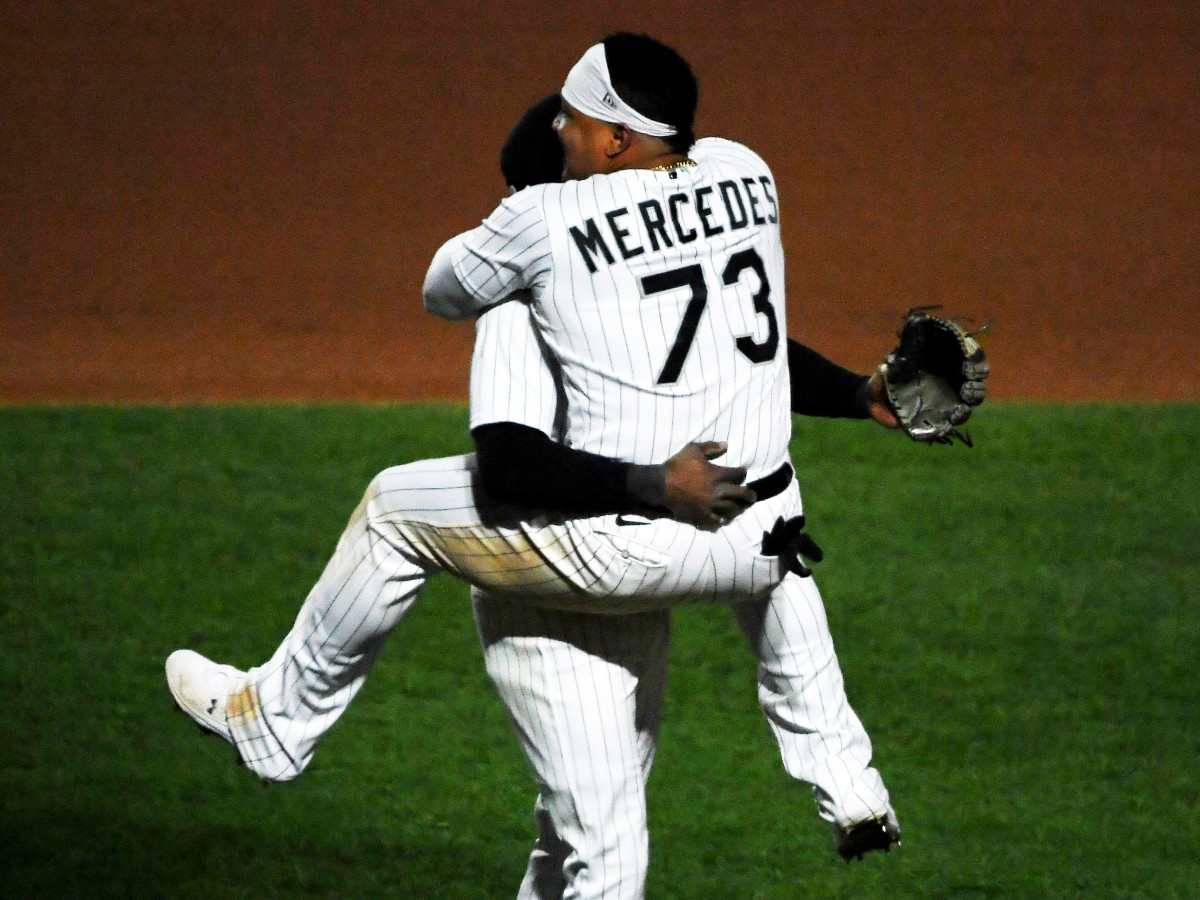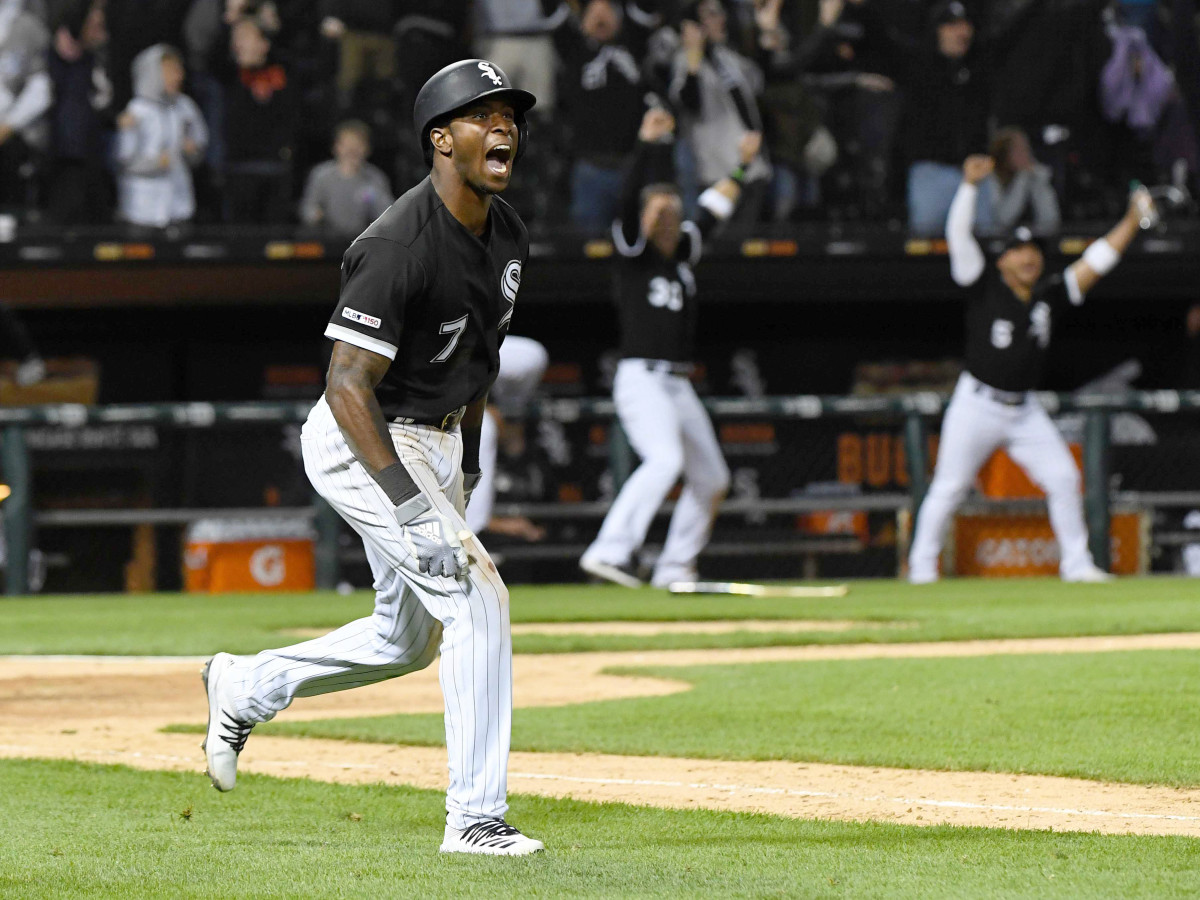The White Sox Are Bringing Winning Baseball Back to Chicago's South Side

It’s May 16 on the South Side of Chicago. Just east of the historic neighborhood of Bridgeport, Guaranteed Rate Field howls with enthusiasm. An announced crowd of nearly 10,000 produces cheers that reverberate throughout the ballpark on a quintessential Chicago spring day. “Let’s Go White Sox!” chants circle around in rhythm like an expertly conducted philharmonic. The shadow of the Chicago skyline wanes in the distance beyond left-center field.
The White Sox trail the Royals 3–2 in the bottom of the eighth inning. José Abreu leads off first base as the tying run. Yermín Mercedes—“The Yerminator”—stands in the right-handed batter’s box. He has looked off-balance in his first three at-bats, grounding out, striking out and popping out in foul territory. In other words, an unproductive day for the rookie sensation.
He swings and misses at a first pitch slider, takes two pitches out of the zone and swings through a fastball, appearing a bit overmatched. Then he fouls off a slider. Then he does it again. And again. Two more pitches zip in. He takes them both out of the zone. He works a walk. The fans roar with approval.
The grinded-out plate appearance personifies the attitude that exists in the ballpark that day, both on the field and in the stands.

“We have a lot of hard-working people who sometimes don’t feel appreciated,” White Sox TV broadcaster Jason Benetti says of their fans. “Sometimes when you’re competitive and you finally get a win—you get knocked around in life a little bit and you finally get a win—you wanna show how much you did to get there and how hard it was to get there.”
After missing out on the postseason from 2009 through 2019 and finishing with a winning record just twice in that span, the White Sox have brought back winning baseball to the South Side. Five years ago, when the Cubs won their first World Series in 108 years and emerged as one of baseball’s model organizations, the Sox were an example of what professional baseball teams shouldn’t do. That season, they feuded over the presence of Adam LaRoche’s 14-year-old son, traded away Fernando Tatís Jr.—then just 16 years old—for veteran James Shields, and angered ace Chris Sale to the point that he cut up all of their throwback jerseys so the team couldn’t wear them. Now, they’ve emerged from the tumult with an exciting core of young players and a steady mix of veterans, while also overcoming a series of injuries, to become one of the best teams in baseball. Entering Friday, Chicago (38–24) holds a 4.5-game lead in the AL Central and is the favorite to win the pennant.
“The biggest thing that sticks out to me is in previous years, we lose a couple games, and the morale is low, and it's like, 'Man, how're we gonna get out of this?' " pitcher Lucas Giolito says. “Whereas now, if we lose one or we even lose two in a row, three in a row, it's like nothing has changed. We come back to the field the next day. We get our work in. We go out and prepare to win. That's just what I love about this team right now. Very resilient, and we're having a lot of fun while winning.”

Two years earlier, the White Sox hosted the Royals at Guaranteed Rate Field. In the fourth inning of a scoreless game, Tim Anderson launched a two-run home run that traveled 418 feet and landed 20 rows past the Sox' bullpen.
Seconds after demolishing the baseball, Anderson took a couple steps toward first base walking backward. He looked into the White Sox dugout on the third base side, grabbed the barrel of his bat with his right hand and flipped it toward his teammates.
I take your bat flip and raise you a bat TOSS. Cocky. Awesome.
— SI MLB (@si_mlb) April 17, 2019
(via @Cut4)pic.twitter.com/DkVORS4dXR
“I’m bringing something to baseball that’s never been brought, as far as the swag,” he told Sports Illustrated’s Stephanie Apstein a week later. “[After the bat flip,] a lot of people who don’t watch baseball, they actually gave me feedback, like, ‘Man, if this is going on in baseball, I better watch it.’ ”
Anderson’s bat flip showcased the White Sox’ new identity, even if they weren’t quite yet ready to win. After finishing 72–89 that year, the front office brought in some veteran talent to complement the younger roster, including Dallas Keuchel and Yasmani Grandal. This was the first time in five years that the White Sox invested significant money in free agents. A new era appeared on the horizon.
The White Sox reached the postseason in 2020 after finishing 35-25 and kicked off their first homestand of 2021 with a bang. Lance Lynn, acquired in a trade from Texas in December, threw a shutout in the home opener. Less than a week later, fans had even more to cheer about when lefty Carlos Rodón threw a no-hitter.
Rodón signed a one-year deal in the offseason, keeping him with the organization that drafted him third in 2014. Over his previous six years in Chicago, he battled several injuries—biceps, shoulder, elbow—and exceeded 100 innings pitched just three times. After all his woes, Rodón’s no-hitter was a fitting representation of his team’s turnaround.
“There were 7,148 in the ballpark, and in the last three innings I think if you listened to our radio broadcast, it probably sounded like there were 35,000,” White Sox radio broadcaster Len Kasper says. “I don’t care if you’re witnessing history or not, when it’s a school night, it’s a Wednesday in mid-April about the sixth or seventh inning, some people are just gonna say, ‘You know what? I’m cold, and I’ve gotta work tomorrow,’ or, ‘I’ve got school tomorrow; I’m heading home.’ Nobody left. It was really cool to see that everybody stayed, not only until the final out was recorded, but they lingered. It’s like they wanted to celebrate with the team on the field.”
Rodón was sure to acknowledge the support he received after the game.
“Tonight was something special. Something I won’t forget,” he said. “Especially to be able to do it in front of fans. It’s been a while since we’ve been able to play in front of fans. Just a special night.”
Jerry Seinfeld pokes fun at sports fandom in a standup set at the start of an episode of Seinfeld.
“Loyalty to any one sports team is pretty hard to justify,” he says. “Because the players are always changing, the team could move to another city. You’re actually rooting for the clothes when you get right down to it. You are standing and cheering and yelling for your clothes to beat the clothes from another city.”
But contrary to Seinfeld’s joke, this White Sox team is more than just a group of guys wearing the same clothes. It’s a blend of young players and veterans, former top prospects and journeymen. Spend one game at Guaranteed Rate Field and you’ll understand the specific connection Sox fans have with the individual players.

“The Yermín Mercedes thing has really taken off. The fans love him,” Kasper says. “Every time José Abreu comes to the plate to this day, you hear chants of, ‘M-V-P! M-V-P!’ Tim Anderson, everything he does is kind of electrifying.
"I think the fans in Chicago are pretty quick to embrace players for great performance, and they make folk heroes out of them pretty quickly. It doesn't happen that way everywhere.”
Kasper cites the recently acquired Billy Hamilton as another example.
“Billy Hamilton’s been around forever, and all of a sudden, he’s hitting home runs. They were serenading him at the ballpark,” he says. “Cleveland released him. We signed him, and all of a sudden, he’s this cult hero in Chicago because he had two or three great games in a row.”
Mercedes became the first such cult hero on the South Side in 2021. After spending eight years in the minor leagues, he had eight hits in his first eight at bats to start the year, a new MLB record.
Anderson and Abreu, meanwhile, have become staples for the Sox. Anderson was a 2013 first-round pick out of community college. He debuted in the big leagues in 2016 and won a batting title in 2019 after hitting .335. Abreu defected from Cuba the year Anderson was drafted, riding 15-foot waves in a small boat in pursuit of his dream to play for an MLB team. After signing the largest contract in White Sox history at the time (six years, $68 million), he was named AL Rookie of the Year in 2014 and was the league’s MVP last season.
The White Sox feature other dynamic position players like Yoán Moncada, who like Abreu, comes from Cuba (though he didn’t defect) and Nick Madrigal, who stands at just 5' 8". (Madrigal, a Rookie of the Year contender, was placed on the 60-day IL Thursday with a hamstring tear.) Together with the pitching staff, ranging in age from 21-year-old Garrett Crochet to 34-year-old Lynn, it all adds up to more than just 26 guys who wear a black and white uniform.
“It’s just this awesome combination,” Giolito says. “The glue that holds it together is our chemistry, our clubhouse philosophy where it’s all about being yourself.”

For as well as the various personalities of White Sox players have meshed, though, their clubhouse hasn’t been completely immune to baseball’s current cultural shift. When 76-year-old Tony La Russa was hired last October after having initially retired from managing in 2011, there was justifiable apprehension over how the older manager would fit with this White Sox team.
“There has been kind of a system of, ‘This is the way the game should be played,’ ” says Kasper of baseball’s cultural divide. “As new generations get to the big leagues and have different ideas of how you celebrate and how you compete, I think celebrating those things is really important for the game to move forward and to continue to draw young and new fans to the game.”
Against the Twins in mid-May, the divide came to a head when La Russa chastised Mercedes for hitting a home run off a 3–0 pitch against a position player with the Sox leading by 11. The incident revived the discourse on baseball’s unwritten rules.
Things escalated the next day when Minnesota reliever Tyler Duffey threw behind Mercedes, and La Russa didn’t take issue with it.
Despite the disagreement, the White Sox have continued to play well.
“At the end of the day, we're all human beings. We have different opinions on things,” Giolito says. “One of the big things about our clubhouse is having that level of mutual respect. We're all about being ourselves. Tony has been a manager for a very, very long time. He's been in baseball for a very, very long time. He has certain values. He has certain things that he believes in, and a lot of us don't necessarily agree with that, and that's O.K.
“Not everyone has to be on the exact same page all the time. I actually think it's kind of unhealthy if everybody was on the exact same page all the time. It's never affected us as a ball club.”
Cultural crisis averted.
It’s the bottom of the ninth inning against the Royals on May 16. The White Sox have runners on first and third with two outs and Grandal at the plate. The game is tied at three.
The entire ballpark comes to its feet. Few phones are out to record the moment. The fans live in the present. One middle-aged man with dark gray hair wearing an adjustable black White Sox cap claps intermittently; his left hand rests on his chin in anticipation of each pitch.
Royals righthander Wade Davis yanks a 1–1 curveball that scoots away from catcher Cam Gallagher. Abreu chugs home from third and slides in safely. The dugout empties in jubilation.
Two dads holding their young kids high-five emphatically. Other fans along the row hug each other. The crowd’s roar sustains the moment, continuing longer than one might expect for a walk-off wild pitch in mid-May. But after a decade of head-scratching trades, failed free-agent signings and lots of losing, the reaction is justified. As they know all too well, success is fleeting.
“There’s something special happening here,” Kasper says. “It doesn’t happen every year, and I’ve enjoyed the heck out of it.”
More MLB Coverage:
• Baccellieri: Arizona's Dubious Shot at History, Summed Up in One Play
• Apstein and Prewitt: 'This Should Be the Biggest Scandal in Sports'
• Baccellieri: Yasmani Grandal Is Doing the Most With the Least—But How?
• Selbe: Brandon Crawford Is Back—And So Are the Giants
